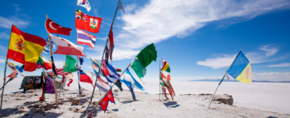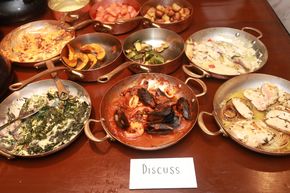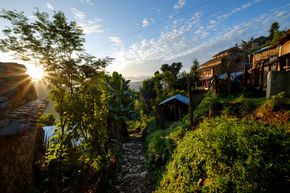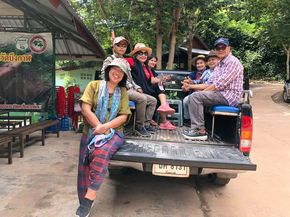From electric boat trips, to local community visits, and bike trips which enable visitors to ‘peddle for the planet’: Thai tourism stakeholders have developed over 100 climate-neutral tours. The example of Thailand shows how cross-sectoral collaboration and the integration of tourism into a national climate strategy can work.
At the heart of Thailand’s efforts to decarbonise is the Thailand Greenhouse Gas Management Organisation (TGO) which was established in 2007 as an autonomous public organization under the Ministry of Natural Resources and Environment. It has developed carbon calculation tools and online platforms for organisations, events and individuals, and manages the Thailand Voluntary Emissions Reduction (T-VER) system. It also provides accreditation for organisations which certify Thai carbon offset projects and facilitates networking and collaboration.
Cross-sectoral collaboration
In September 2021, TGO and the Ministry of Tourism and Sports facilitated the ‘Carbon Balance’ Memorandum of Understanding (MOU) to drive Thailand towards zero-emission tourism. The MOU involved eight leading Thai tourism organisations, including three key ministries: the Ministry of Tourism and Sports, Ministry of Higher Education, Science, Research and Innovation, and Ministry of Natural Resources and Environment. The Thai Ecotourism and Adventure Travel Association (TEATA) was a leading private sector signatory. The MOU signatories are committed to raise public awareness about climate change, develop carbon neutral activities and tours, and promote a net zero carbon approach in the Thai tourism and events industry.
Since 2021, the partners have worked consistently to translate aspirations into action. TGO developed calculators and Apps for measuring the carbon footprints of tourism activities. These are part of an integrated approach for products, lifestyles, travel and events, linked through a carbon market to over 100 Thai carbon offsetting projects around the country. TEATA worked with TGO to design and develop inspiring new tourism routes that reduce carbon emissions. This work is being supported at high level by the Thai government, with financial and scientific support from leading Thai policy and research organisations, Thailand’s Program Management Unit for Competitiveness (PMUC),Thailand Science Research and Innovation (TSRI), and marketing support from the Tourism Authority of Thailand (TAT).
In 2022, the EU SWITCH-ASIA Tourlink project supported European and Thai carbon experts to compare and align methods and datasets for calculating the carbon footprint of tourism itineraries. Recognition of the TGO system by Carmacal, an UNWTO award winning tool, which allows tour operators and travel companies to comprehensively measure the carbon footprint of their tour packages, adds international credibility to the Thai tools. Most importantly, the project enables carbon offset purchased by European travellers or tour operators to directly support local carbon offset projects.
Beyond ‘paying to pollute’
The TEATA team members are aware of the weaknesses of carbon offsetting, and are working hard to go beyond the cliché of ‘paying to pollute.’ For each carbon neutral tour, there is a three-step process. First, TEATA helps the supplier to measure the carbon footprint of their existing tour. The calculation is based on four key tourism related emissions: transport, accommodation, food and waste.
Second, the carbon footprint is reduced by adjustments to trip design. For example, tour operators may use more eco-efficient routes. They may replace a drive with biking or kayaking. Petrol vehicles may be replaced by e-vehicles. Meals may be sourced from local restaurants, or families. Classic sightseeing activities may be replaced with a visit to an organic market, to a local village or nature conservation activities. The supplier may also choose a greener hotel. Then the programme is measured again, and remaining emissions are offset through Thai projects under the TGO.
To avoid ‘overclaiming’, the scope of TEATA’s claims of carbon neutrality are clearly laid out. It begins when tourists arrive at the tour’s starting point, and ends at the tour’s ending point. The scope of carbon neutrality includes all tourism services which are included in the itinerary and excludes any additional, personal choices by tourists (optional tours, souvenirs, transportation to and from the starting and ending point, etc.).
Each carbon neutral tour is operated by a local supplier who has successfully submitted their tour programme for TGO certification. Only certified suppliers are authorised by TGO to sell their routes as ‘carbon neutral’. Once tourists or tour operators have decided to travel to Thailand, the tours can help to reduce their carbon footprints while travelling inside the country. TEATA can help to connect them directly to local suppliers.
TEATA also trains Thai tour operators to use the tools developed by TEATA and TGO to develop their own carbon neutral tours. TGO and partners are also striving to make carbon footprint calculation more accessible to small and medium-sized enterprises and communities, through simple mobile-phone apps. Most recently, the Zero Carbon App was developed as a user-friendly and cost-free application, which empowers operators to conduct a self-assessment of the carbon footprint of their tours. Tour operators can offset their carbon footprint directly through the application. This not only promotes environmental responsibility but also simplifies the complex process of decarbonisation, eliminating the need for third-party audits.
The decision about whether to fly long-haul or not is a difficult one. TEATA and partners respect any tourist or tour operator who decides to reduce their carbon footprint by avoiding long-haul travel. However, from a destination perspective, the carbon neutral tours represent a rigorous effort by local stakeholders to offer more climate-sensitive choices.
Peter Richards has been working in responsible tourism in Asia for over 20 years and is currently the Project Manager of the EU SWITCH ASIA Tourlink Project, supporting Thai tourism stakeholders who promote over125 ‘carbon neutral’ tours.
The Thai Carbon Neutral Tours can be found at ITB 2024 in Berlin: TAT booth 217 in hall 26 B. Book a meeting here. Switch Asia is in hall 4.1, booth 213.


![[Translate to english:] Zwei Menschen unterwegs mit SUPs](/fileadmin/tourismwatch/_processed_/f/d/csm_4._SUP_343cc84a45.jpg)




